|
|
|
Sort Order |
|
|
|
Items / Page
|
|
|
|
|
|
|
| Srl | Item |
| 1 |
ID:
121502
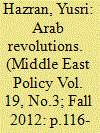

|
|
|
| 2 |
ID:
111731
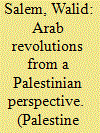

|
|
|
|
|
| Publication |
2012.
|
| Summary/Abstract |
Let me start with the following question: Have Arab countries started the transition to democracy or not? This is the question now being asked around the world. To address this question I will begin with a quotation from Professor Sa'ad Eddin Ibrahim, who suggested that the Arab region has the plight of a triangle of actors. These three actors are al-toghah, al-gulah and alghuzah. Toghah are the authoritarian regimes, gulah are the extremists and ghuzah are the invaders. The thesis of Ibrahim was that it was the toghah, the authoritarian regimes who created the gulah, the extremists, as another despotic response to the despotism of the authoritarian regimes. Despotism creates another form of despotism. Then together the toghah and the gulah, the authoritarians and the extremists, brought the ghuzah, the invaders to the region, such as what happened in Iraq. In order to have democracy in Iraq, you have to do it through an invasion from outside.
|
|
|
|
|
|
|
|
|
|
|
|
|
|
|
|
| 3 |
ID:
107214
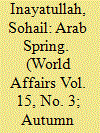

|
|
|
| 4 |
ID:
124946
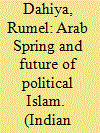

|
|
|
| 5 |
ID:
105039
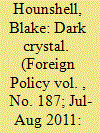

|
|
|
|
|
| Publication |
2011.
|
| Summary/Abstract |
In early March, California Sen. Dianne Feinstein, who heads the Senate Intelligence Committee, complained that America's spooks had failed to warn about the risks of uprisings in the Arab world. Instead, they had provided "nothing that we didn't read in the newspapers," she griped. "Whether it was Yemen, or Bahrain, or Egypt … nothing." James Clapper, the director of national intelligence, had been forced to acknowledge at an earlier hearing, "We are not clairvoyant."
|
|
|
|
|
|
|
|
|
|
|
|
|
|
|
|
| 6 |
ID:
121619
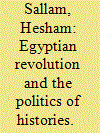

|
|
|
|
|
| Publication |
2013.
|
| Summary/Abstract |
The Arab "revolutions" and the events surrounding them have posed a variety of theoretical challenges to political scientists. Popular uprisings have resulted in the ouster of long-standing autocrats in Tunisia, Egypt, Libya, and Yemen, and are seriously threatening the survival of incumbent authoritarian rulers in a region that once seemed immune to democratic change (Brumberg 2002; Fish 2002; Heydemann 2007; Posusney and Angrist 2005; Salamé 1994; Schlumberger 2007). These unforeseen developments pushed scholars of politics back to the drawing board to revisit dominant theoretical understandings of the drivers of regime change and stability (Albrecht and Bishara 2011; Bellin 2012; Blaydes and Lo 2012; Brownlee and Stacher 2011; Droz-Vincent 2011; Gause 2011; Goldstone 2011; Hoffman and Jamal 2012, Lynch 2011; Masoud 2011; Stacher 2012).
|
|
|
|
|
|
|
|
|
|
|
|
|
|
|
|
| 7 |
ID:
144491
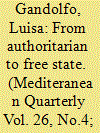

|
|
|
|
|
| Summary/Abstract |
Discourses on the Arab revolutions have, to date, focused on regime change and its implications for future democratization in the region. This essay explores the impetus behind the religiopolitical tensions in Tunisia and posits that to grasp the events unfolding since 2010 the unrest must be located within an understanding of the dynamic between the Islamists and the state under President Habib Bourguiba and, later, President Zine El Abidine Ben Ali. The essay revisits the terms revolutionary and revolution within the Tunisian context and reflects on the application of the label revolutionary, contending that the act of selective labeling bears implications for an objective understanding of the revolution and its actors. Finally, the essay evaluates how far the political tensions of the past continue to mark the present through the subsequent generation of religious movements emerging from the revolution.
|
|
|
|
|
|
|
|
|
|
|
|
|
|
|
|
| 8 |
ID:
178476
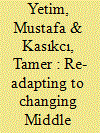

|
|
|
|
|
| Summary/Abstract |
This article investigates the current modification in Turkey’s actor perception according to the Middle East’s changing dynamics. Clarifying the shift in Turkish foreign policy under the Justice and Development Party (JDP) and the emergent structural realities in the Middle East as a result of increasing agency of the violent non-state actors (VNSAs) in the aftermath of several Arab revolutions, the current article scrutinizes the adaption of Turkish foreign policy to these regional realities. In this context, to prove Turkey’s active orientation toward the recent regional environment, its exceptional engagement with one of the important VNSAs, namely the Free Syrian Army (FSA) or Syrian National Army (SNA), has been empirically examined. Within this background, the current resurrection of the VNSAs in the Middle East and regional-global actors’ reactions to this reality will also be analyzed. Afterward, Turkey’s unique and swift compliance with this reality and the consequent modification of its actor perception will be explored.
|
|
|
|
|
|
|
|
|
|
|
|
|
|
|
|
| 9 |
ID:
104765
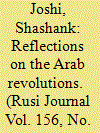

|
|
|
|
|
| Publication |
2011.
|
| Summary/Abstract |
We are witnessing a series of revolutions and uprisings of a pace, connectivity and breadth for which the only parallel in modern history is 1989. But these aspirant and actual revolutions are incomplete, uneven and unpredictable. Shashank Joshi argues that long-held assumptions about the Western trilemma in the Middle East - the choice between democracy, stability and pro-Western foreign policy - must now be urgently re-evaluated.
|
|
|
|
|
|
|
|
|
|
|
|
|
|
|
|
| 10 |
ID:
156335
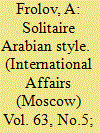

|
|
|
|
|
| Summary/Abstract |
LAST SPRING, an event in the Arab world shocked everyone. The Kingdom of Saudi Arabia (KSA), Bahrain and the United Arab Emirates (UAE) withdrew their ambassadors from Doha, the capital of Qatar, their ally. One of the smallest members of the Cooperation Council for the Arab States of the Gulf (GCC) was accused of supporting "anyone threatening the security and stability of the GCC whether as groups or individuals - via direct security work or through political influence ... and hostile media."
|
|
|
|
|
|
|
|
|
|
|
|
|
|
|
|
| 11 |
ID:
107186
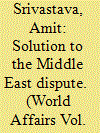

|
|
|
| 12 |
ID:
105005
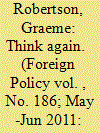

|
|
|
|
|
| Publication |
2011.
|
| Summary/Abstract |
Rarely, if ever. In the first months after the Arab revolutions began, the world's televisions were filled with instantly iconic images of a crumbling old order: the Ben Ali clan's seaside villa on fire in Tunisia, Hosni Mubarak's stilted pre-resignation speeches in Egypt, Muammar al-Qaddafi's rambling, defiant diatribes from a bombed-out house in Libya. They were a reminder that one of the most enduring political archetypes of the 20th century, the ruthless dictator, had persisted into the 21st.
|
|
|
|
|
|
|
|
|
|
|
|
|
|
|
|
|
|
|
|
|